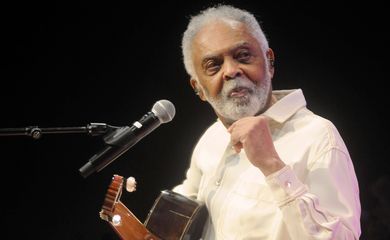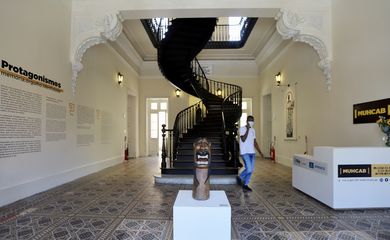GLA and city hall open Literature Circuit in Rio
The Brazilian Academy of Letters and the city of Rio de Janeiro, through the Instituto Rio Patrimônio da Humanidade, launched today (1st) the Literature Circuit, with the inauguration of the first of the plaques that will identify the houses where occupants lived as cultural heritage of the city. of the ABL chairs. The first plaque was delivered to the family of literary critic, poet, orator and lawyer Rodrigo Octavio Filho, who occupied Chair 35 of the ABL and resided at Rua São Clemente, 421, in Botafogo.
The president of ABL, professor Marco Lucchesi, was represented at the ceremony by the secretary general of the institution, journalist Merval Pereira.

In an interview with Agência Brasil , upon returning from a trip to the North of the country, Lucchesi said that the idea was born many years ago, motivated by the demand of several academics who wanted visibility for a specific geolocation project in the city of Rio de Janeiro for members of ABL and their respective houses. At Merval Pereira's request for the project to be resumed, Lucchesi set up a commission whose rapporteur was the journalist. With the covid-19 pandemic, however, the project was stopped again.
In parallel, however, ABL museologist Anselmo Maciel produced a book that encompassed all the locations and homes of academics in Rio de Janeiro. “The idea is to make it to Brazil later, but, for now, the focus is on Rio,” said Lucchesi. This map should be made available later on the ABL website .
new impulse
According to Lucchesi, the abandonment of the city center was aggravated by the covid-19 pandemic, but the project gained new impetus in January of this year, when the ABL convened all cultural institutions in the region to discuss the revitalization of the area and, with their support of all, he sent a letter to the mayor of Rio, who already had proposals for the city's recovery. “It was a happy meeting,” said Lucchesi. The city hall provided the layout [graphic project] of the boards, and the ABL provided the content. ”This story mainly means the concern to recover the city center and give the correctly maintained houses another soul, the soul of Rio de Janeiro's past (…). That's the idea.”
The project, formerly called Onde Lived os Acadêmicos, was renamed Circuito da Literatura (Literature Circuit), as part of the Circuits of Cultural Heritage in Carioca. The ABL initiative was promptly and quickly accepted, in all possible procedures, including family members, said Marco Lucchesi.
The second honoree of the Circuito da Literatura will be professor and historian Américo Jacobina Lacombe, occupant of Chair 19 of the ABL, whose plaque will be installed at Rua Dezenove de Fevereiro, 105, also in Botafogo. The Literature Circuit will have around 100 boards, which will be installed over the next year.
historical record
“There's nothing fairer than paying homage to these people and, above all, showing the city history, [showing] where the academics lived. It is not only a tribute, but also a historical record that can inspire our young people to follow this path of intellectuality”, said Mayor Eduardo Paes at the project's launching ceremony.
Rodrigo Octavio Filho's granddaughter, Irene Moutinho, thanked the academy and the Rio city hall for the tribute. of this nearly century-old residence.”
Merval Pereira highlighted that Rodrigo Octavio Filho's house is a reference for a collective memory that helps to preserve knowledge of the past and strengthens the idea of belonging. According to the secretary general of the academy, the idea of belonging is registered in the choice of the academic's home to inaugurate the literary circuit, because Rodrigo Octavio Filho has a direct line to the foundation of the ABL. “His father, Rodrigo Octavio, was one of the intellectuals who participated in the creation of the ABL”, revealed Merval.
The nameplates of relevant properties and places started to be installed by the city hall in 1992, but, since 2010, the Circuits of Carioca Cultural Heritage are no longer focused on architecture and started to cover free themes, linked to Rio's culture and identity. , such as bossa nova, pubs, samba, cinemas, Praça Tiradentes, choro and African heritage, among others. An informational sign posted on the site gives visitors the opportunity to learn a little more about that area and its importance to the city's history and topic.
Text translated using artificial intelligence.






